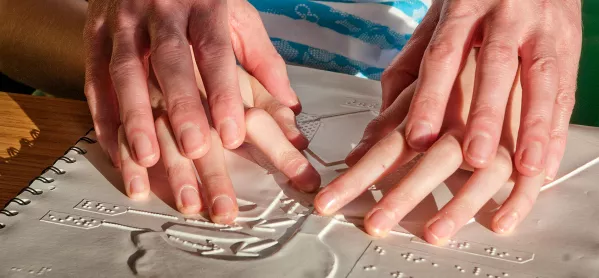- Home
- Analysis
- Specialist Sector
- The push for ITT in special schools is welcome - but work lies ahead
The push for ITT in special schools is welcome - but work lies ahead

Last month the Department for Education issued non-statutory guidance aimed at helping initial teacher training (ITT) providers to develop effective partnerships with special schools and alternative provision (AP).
Following this guidance would give trainee teachers a better “understanding of how to plan and teach more effectively for all children”, the government said.
It’s an initiative that we at Nasen have certainly welcomed and it was a topic of consideration at the latest meeting of our SEND Reference Group, chaired by our CEO, Annamarie Hassall.
The group noted that providing broad and diverse teacher training can only help the educational experiences of all pupils, and it was pleasing to see this recommendation from the ITT market review being taken forward in this way.
Teacher training placements in special schools
Indeed, with this new guidance to providers, it is now expected that more ITT placements in special schools and AP will provide early career teachers with insight into the education system as a whole, enabling them to make informed choices about the career pathways they may experience.
The guidance describes this as creating a “golden thread” of professional development that teachers can draw on at every stage of their careers.
Members of the SEND Reference Group hope that this will encourage the transfer of skills and expertise across settings and raise the profile of settings other than mainstream schools
Dr Kim Taylor, chair of Cambridgeshire Special School Headteachers, said that not only would this give trainee teachers experience of other settings that they may wish to work in but it would also enable them to better support all pupils through what they would learn and experience.
“For [teacher trainee] students to learn how child development theory is understood and implemented in specialist settings can only enrich practice in mainstream settings. For really good inclusion, students should be able to see different stages of development rather than phases,” she said.
She noted, too, that giving trainees the chance to conduct work experience in more settings could also make them more aware of the career opportunities that exist beyond the mainstream.
“To enable trainees to actually understand what true inclusion might look like, we should be giving them opportunities to explore different settings, then specialise so that they can follow their passions,” Taylor added.
It was a view echoed by Penny Barratt, CEO of The Bridge London Trust, who said that “the education system is the education system and you’ve got to understand it all” - and that with more awareness of other settings, many teachers thinking about leaving the profession might instead try another path.
Mark Dale-Emberton, principal of Charlton Park Academy in London, said this was an especially important point because at present special schools and AP settings are bearing the brunt of the recruitment crisis, with nearly three times more teaching posts filled by temporary workers.
He said he hoped that placements in special schools and AP will encourage more early career teachers to consider working in the specialist sector - and that it could open up more routes for trainees who wish to train solely in a specialist settings, too.
The expertise in specialist schools
Ms Hassall added that, as the teachers’ standards can be demonstrated in both special and mainstream schools, more ITT placements in different settings will allow a deeper understanding of the standards and their relevance across the system.
With the depth of skill and expertise of professionals working in specialist schools well regarded across the sector - and given this clear boost by the DfE guidance - there should now be more opportunities for trainees to view this first-hand and raise the status and desirability of teaching in such settings.
The group noted, though, that there is work to do to ensure that partnerships are undertaken in a meaningful way, with ITT providers working to recruit trainers with experience in special schools and AP.
To enable the effective transfer of knowledge and the whole-development of early career teachers, those leading their training should have a deep understanding of provision across multiple settings.
Expertise at this level will also help to avoid a silo approach to special school and AP teaching placements.
Finally, caution was expressed about mandating placements in any type of setting to avoid them becoming a tick-box exercise, rather than what is desired: a purposeful and effective learning experience that has benefits in both mainstream and specialist settings for teachers and pupils alike.
Kamal Bodhanker is senior leader and head of international development at Nasen (National Association for Special Educational Needs)
Nominations for this year’s Nasen Awards close on 23 June. To find out more and submit your nomination, visit nasen.org.uk/awards
Register with Tes and you can read two free articles every month plus you'll have access to our range of award-winning newsletters.
Keep reading with our special offer!
You’ve reached your limit of free articles this month.
- Unlimited access to all Tes magazine content
- Save your favourite articles and gift them to your colleagues
- Exclusive subscriber-only stories
- Over 200,000 archived articles
- Unlimited access to all Tes magazine content
- Save your favourite articles and gift them to your colleagues
- Exclusive subscriber-only stories
- Over 200,000 archived articles
topics in this article



